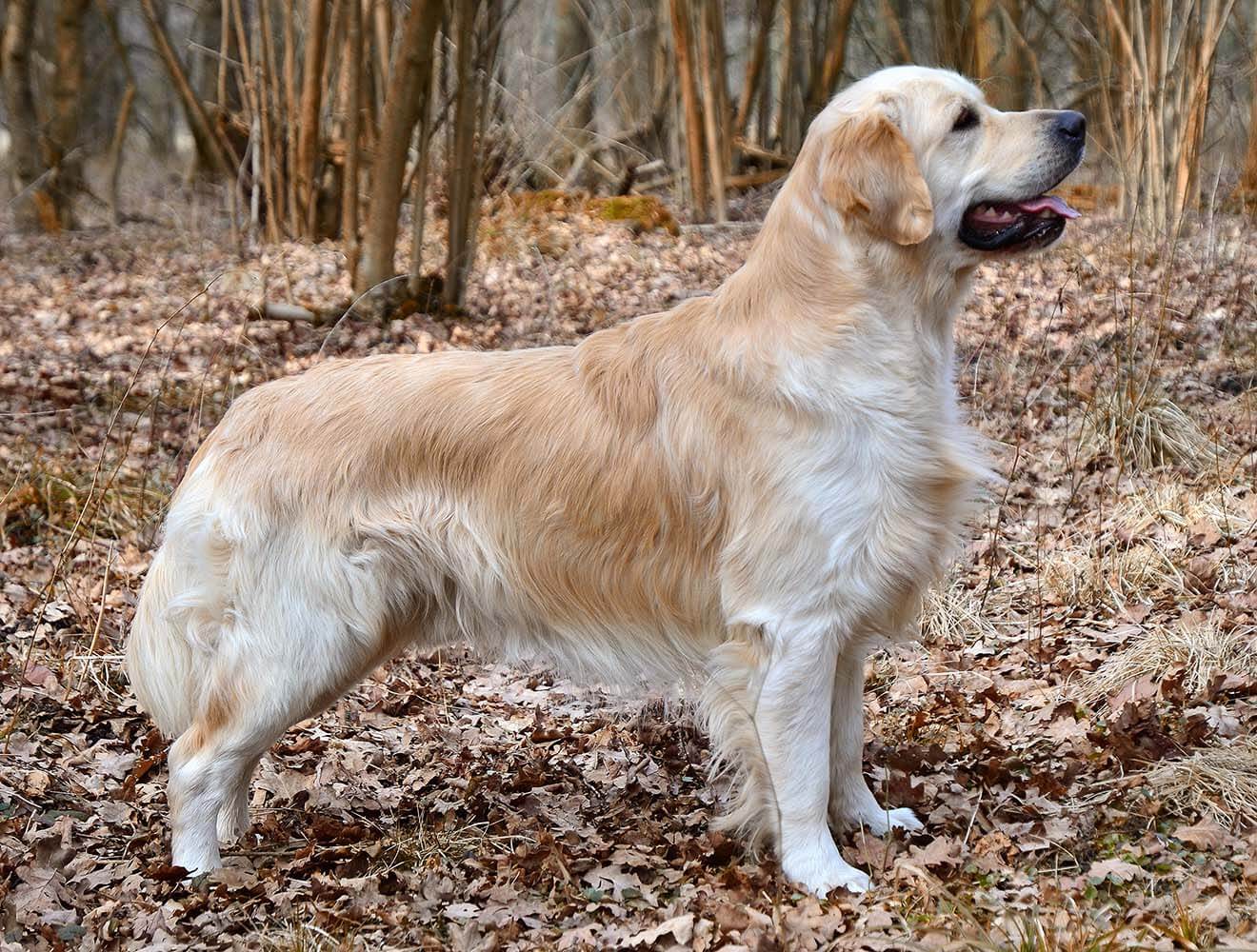Golden Retriever
Table of Contents
Golden Retrievers, often referred to as “Goldens,” are one of the most beloved and popular dog breeds in the United States and around the world. With their friendly disposition, intelligence, and striking golden coats, it's no wonder these dogs have captured the hearts of millions.
In this guide, we will delve into every aspect of facts golden retriever, from their history and characteristics to their care, training, and health. Whether you're a proud Golden owner or considering bringing one into your life, this article will provide you with a wealth of valuable information.
The History of Golden Retrievers
The History of Golden Retrievers is a fascinating tale that traces its roots to late 19th-century Scotland. These beloved canines were meticulously bred for a specific purpose: hunting, with an emphasis on retrieving waterfowl from both land and water. To achieve the ideal blend of traits, breeders incorporated a diverse lineage that included Retrievers, Spaniels, and Water Dogs.
The inaugural chapter in the Golden Retriever saga was written with the registration of the first official member of the breed in 1903. This pioneering pup, aptly named “Nous,” marked the beginning of a remarkable journey. Over the decades, golden retriever dog breed have captured the hearts of countless individuals and families around the world.
Their endearing qualities, characterized by unfaltering friendliness and unwavering obedience, have transcended their original hunting purpose. These dogs have seamlessly transitioned from skilled hunting companions to cherished family pets, embodying the true essence of loyalty and affection. Today, the history golden retriever stands as one of the most beloved and iconic canine breeds globally, carrying with it a rich history steeped in tradition and purpose.

Golden Retriever Characteristics
Golden Retrievers are renowned for a host of distinctive characteristics that set them apart in the world of canine companions:
Physical Appearance
These dogs possess a striking physique, characterized by a well-proportioned body draped in a dense, water-repellent coat. This signature coat showcases a breathtaking spectrum of hues, ranging from a light, glistening gold to a deep, lustrous amber. Their faces tell a story of warm-heartedness, with expressive eyes that seem to radiate kindness, and a friendly countenance that instantly captivates.
Temperament
The heart and soul of Golden Retrievers are their exceptionally friendly, gentle, and intelligent natures. These remarkable traits make them not just excellent pets but cherished family members. They effortlessly weave themselves into the fabric of family life, displaying unwavering loyalty, and a boundless affection that knows no bounds. Their intelligence shines through in their quick learning and adaptability, making them a delight to train and be around.
Size
Golden Retrievers present a sturdy and well-proportioned frame. Adult males typically tip the scales between 65-75 pounds (29-34 kg), while their female counterparts weigh slightly less, typically ranging from 55-65 pounds (25-29 kg). At the shoulder, they stand gracefully at a height of approximately 22-24 inches (56-61 cm). This balanced stature complements their athleticism and agility, allowing them to excel in various activities from outdoor adventures to indoor snuggles.
Intelligence and Trainability
Golden Retrievers are not only intelligent but also highly trainable. Their eagerness to please their owners is a testament to their cooperative nature. This makes them excel in obedience training, agility, and various dog sports. They thrive on mental stimulation and readily pick up commands, making them ideal companions for both novice and experienced dog owners.
Playfulness and Enthusiasm
These dogs are perpetual bundles of energy and enthusiasm. Their playful disposition is infectious, whether they're frolicking in the backyard, chasing a ball, or simply basking in the joy of companionship. This natural zest for life keeps them youthful at heart throughout their lives, making them wonderful playmates for children and adults alike.
Versatility
Golden Retrievers are true all-rounders. While they were initially bred for retrieving waterfowl, their versatility knows no bounds. They excel in various roles, from being loyal family pets to working as therapy dogs, search and rescue canines, and even in roles in the entertainment industry. Their adaptability allows them to thrive in a wide range of environments and activities.
Choosing the Right Golden Retriever
When contemplating the addition of a Golden Retriever to your family, a thoughtful and informed decision is key. Here's a comprehensive guide to help you navigate this important choice:
- Lifestyle Assessment: Begin by evaluating your lifestyle and how a Golden Retriever might fit into it. These dogs are known for their sociable and active nature, so ensure you have the time and energy to cater to their needs. Consider factors such as your daily routine, exercise regimen, and living situation.
- Puppy or Rescue Dog: Decide whether you want to bring a puppy into your home or provide a loving forever home to a rescue dog. Puppies offer a blank slate for training and bonding, but they require substantial time and effort. On the other hand, rescue dogs can be a wonderful choice for those seeking a more mature and potentially lower-maintenance companion.
- Breeders and Rescue Organizations: If you opt for a puppy, research reputable breeders who prioritize the health and well-being of their dogs. Look for breeders who conduct health screenings and provide proper socialization. For rescue dogs, seek out reputable rescue organizations that assess the temperament and health of their available dogs. Reputable sources prioritize the welfare of the animals.
- Temperament: Consider the temperament of the Golden Retriever you're interested in. This breed is renowned for its friendly, affectionate, and intelligent disposition. However, individual dogs may have unique personalities. Spend time with the dog, if possible, to gauge their compatibility with your family and lifestyle.
- Health and Lineage: Inquire about the health history and lineage of the dog. Responsible breeders maintain detailed health records and can provide information about genetic testing. For rescue dogs, obtain as much medical history as possible. A healthy lineage and medical background contribute to a happy and long-lasting companionship.
- Age: Decide whether you want a puppy or an adult dog. Puppies require extensive training, while adult dogs may already be house-trained and have established temperaments. Your choice should align with your experience and preferences.
- Training and Socialization: Plan for training and socialization, which are crucial for a well-behaved and happy Golden Retriever. Puppy training classes or working with a professional dog trainer can be invaluable.
- Commitment: Remember that adopting a Golden Retriever is a long-term commitment. These dogs often live for a decade or more. Ensure you are ready for the responsibility and can provide a loving home throughout their lifespan.

Golden Retriever Puppy Care
Welcoming a Golden Retriever puppy into your life is a rewarding but multifaceted journey that demands your unwavering commitment. To ensure your puppy blossoms into a well-adjusted and happy adult dog, consider the following comprehensive aspects of puppy care:
Nutrition
A crucial foundation for your puppy's growth and development is a balanced diet. Consult your veterinarian to choose the right puppy food that meets their specific age, size, and nutritional requirements. Establish a regular feeding schedule to provide consistency and monitor their growth closely. Golden Retriever puppies are prone to overeating, so portion control is important.
Vaccination Schedule
Protecting your puppy from preventable diseases is a top priority. Collaborate with your veterinarian to design a tailored vaccination schedule that aligns with your puppy's age and health status. Ensure your puppy receives essential core vaccines, such as those for distemper and parvovirus, and discuss optional vaccines based on your location and lifestyle.
Socialization
Early socialization is vital for Golden Retriever puppies to develop into confident and well-mannered adults. Expose your puppy to various people, animals, environments, and situations in a positive and controlled manner. This builds resilience, reduces fear, and promotes appropriate behavior. Enroll in puppy socialization classes to facilitate structured learning and interactions.
Training and Obedience
The journey to a well-behaved adult dog begins with consistent training. Start with basic commands like sit, stay, and recall. Utilize positive reinforcement techniques, such as treats and praise, to motivate and reward good behavior. Enrolling in puppy training classes or seeking guidance from a professional dog trainer can accelerate the learning process.
Exercise and Mental Stimulation
Golden Retriever puppies are known for their boundless energy. Engage them in regular exercise and mental stimulation to prevent boredom and promote healthy development. Daily walks, interactive toys, and puzzles are effective ways to channel their energy positively.
Golden Retriever Training Tips
Training a Golden Retriever is an exciting and fulfilling endeavor, thanks to their intelligence and strong desire to please. To help you achieve success in molding your Golden Retriever into a well-behaved companion, here's an in-depth guide with a wealth of training tips:
Start Early
The foundation of a well-trained Golden Retriever begins in puppyhood. Start training as soon as you bring your puppy home. Early training helps establish good habits and behaviors, making it easier to shape their development.
Positive Reinforcement
Golden Retrievers respond exceptionally well to positive reinforcement. Use rewards like treats, praise, and affection to reinforce desired behaviors. Consistently reward your dog when they follow commands or exhibit good behavior. This encourages them to repeat these actions.
Basic Obedience
Obedience training is a fundamental aspect of a well-behaved dog. Teach basic commands such as sit, stay, down, come, and leave it. Begin with one command at a time, ensuring your puppy fully comprehends before moving to the next. Keep training sessions short and enjoyable.
Socialization
Early socialization is vital for Golden Retrievers. Expose them to various people, animals, environments, and situations during their formative months. Socialization builds confidence, reduces fear, and fosters appropriate behavior. Enroll in puppy socialization classes to provide structured interactions with other dogs.
Housebreaking
Housebreaking, or potty training, is essential for a harmonious home. Establish a consistent routine for feeding, bathroom breaks, and playtime. Take your puppy outside after eating, waking up, and before bedtime. Praise and reward them when they eliminate outdoors. Be patient and consistent to avoid accidents indoors.
Crate Training
Crates can be a valuable tool for training and providing a safe space for your puppy. Introduce the crate gradually, associating it with positive experiences. Use it for short periods and gradually extend the time. Ensure the crate is comfortable with bedding and toys.

Common Golden Retriever Health Issues
Golden Retrievers, renowned for their friendly disposition and loyalty, are a beloved breed that can be susceptible to various health issues. Among these, hip dysplasia, elbow dysplasia, and specific heart and eye conditions are the most prevalent. These health concerns can potentially affect the quality of life for your canine companion, making it crucial for responsible pet owners to be well-informed and proactive in their care.
- Hip Dysplasia: This hereditary condition involves the improper formation of the hip joint, which can lead to pain and discomfort as the dog ages. Regular exercise, maintaining a healthy weight, and providing supplements recommended by your veterinarian can help manage this condition.
- Elbow Dysplasia: Elbow dysplasia is another orthopedic issue that Golden Retrievers may face. It affects the elbow joint, causing lameness and discomfort. Early detection through regular vet check-ups and appropriate treatment, such as surgery or medication, can significantly improve your dog's comfort.
- Heart Conditions: Golden Retrievers are also prone to certain heart conditions, including dilated cardiomyopathy and subaortic stenosis. These conditions can potentially impact the heart's ability to pump blood effectively. Routine heart screenings and medication can help manage these conditions if detected early.
- Eye Issues: Ocular disorders like cataracts and progressive retinal atrophy can develop in Golden Retrievers, leading to vision impairment or blindness. Regular eye examinations by a veterinary ophthalmologist can identify these issues early on, allowing for timely interventions like surgery or medication.
Golden Retriever Lifespan and Aging
Golden Retrievers, beloved for their friendly nature and loyal companionship, typically have an average lifespan that ranges from 10 to 12 years, but many individuals can surpass these expectations with attentive care and a healthy lifestyle. As these remarkable dogs age, their needs and considerations evolve, necessitating adjustments in various aspects of their care.
Diet and Nutrition
A key aspect of Golden Retriever aging is their dietary requirements. As they get older, their metabolism may slow down, and they might become less active. Consequently, it's crucial to adapt their diet to maintain an ideal body weight and support joint health. Consult your veterinarian to determine the most appropriate senior dog food or dietary modifications.
Exercise and Activity
While Golden Retrievers are known for their energy and enthusiasm, older dogs may experience a decrease in their mobility and stamina. Adjust their exercise routines to suit their age and physical condition, opting for gentler activities like leisurely walks instead of vigorous play sessions.
Health Monitoring
Regular veterinary check-ups become even more critical as your Golden Retriever ages. These visits allow for early detection and management of age-related health issues, including arthritis, dental problems, and vision or hearing impairment. Vaccination schedules should also be adjusted in consultation with your vet.
Joint Health
Golden Retrievers are prone to joint issues like arthritis, which can become more pronounced in older dogs. Consider joint supplements or medications prescribed by your veterinarian to alleviate discomfort and maintain mobility.
Dental Care
Dental hygiene is vital throughout a dog's life, but it becomes even more crucial as they age. Regular teeth cleaning and dental check-ups can prevent periodontal disease and related health problems.
Cognitive Function
Just like humans, dogs can experience cognitive decline as they age. This condition, known as Canine Cognitive Dysfunction (CCD), may manifest as disorientation, changes in sleep patterns, or altered behavior. Specialized diets and medications can help manage these symptoms.
Emotional Support
Aging Golden Retrievers may require extra emotional support and attention. They may become more anxious or clingy, and providing a calm and comforting environment can help them navigate these changes.
Golden Retriever FAQs
Q: Is a Golden Retriever high maintenance?
A: Golden Retrievers are not considered high maintenance compared to some other breeds, but they do require regular care. They have a moderate grooming requirement, need daily exercise, and thrive on social interaction. Regular grooming, exercise, and attention to their health needs are essential to keep them happy and healthy.
Q: Is Golden Retriever a good house pet?
A: Yes, Golden Retrievers are known for being excellent house pets. They are friendly, affectionate, and great with families. They have a gentle temperament and are usually good with children and other pets. However, they do require attention, exercise, and training to ensure they are well-behaved in a home environment.
Q: What is the most common cause of death in Golden Retrievers?
A: The most common causes of death in Golden Retrievers include cancer, particularly hemangiosarcoma and lymphoma. Other common health issues that can contribute to their mortality are hip dysplasia, heart disease, and certain genetic conditions. Regular veterinary check-ups and a healthy lifestyle can help mitigate some of these risks.
Q: Do Golden Retrievers shed very much?
A: Yes, Golden Retrievers are known to shed quite a bit. They have a double coat that sheds throughout the year, with heavier shedding occurring in the spring and fall. Regular brushing can help manage their shedding, but be prepared for some level of fur around your home, especially during shedding seasons.
Conclusion
Golden Retrievers are a remarkable breed known for their friendly demeanor, intelligence, and adaptability. Whether you're considering bringing one into your family or are already a proud Golden owner, understanding their history, characteristics, and care requirements is essential to ensure a happy and healthy life for your beloved furry friend.
In this guide, we've covered the history, characteristics, care, training, health, and much more about Golden Retrievers. By following the tips and guidelines provided, you can enjoy a fulfilling and loving relationship with your Golden Retriever.
Sources
https://www.ncbi.nlm.nih.gov/pmc/articles/PMC4581032/
https://www.morrisanimalfoundation.org/golden-retriever-lifetime-study













